Topic: Community Colleges
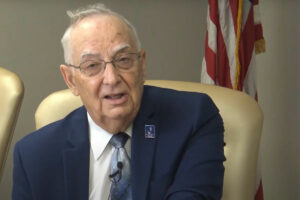
Interview of Dale Dennis, August 28, 2020
Interviewed by Andy Tompkins
People interested in the development of education policy in Kansas will find no better resource than this 2020 oral history interview with Dale Dennis, Deputy Commissioner of Education. The interview was conducted by Dr. Andy Tompkins, a former Kansas Commissioner of Education. During the interview, Dennis speaks candidly about policy development, identifying the issues and the legislators who were intrinsically involved. The interview covers the 1972 lawsuit which was the first dealing with issues of equity in school funding. Twenty years later, a 1992 school finance lawsuit again challenged the lack of equalization which rendered the formula unconstitutional. Dennis explains Show Morein detail the process by which the Legislature, Governor Joan Finney, Speaker Marvin Barkis, and others went about addressing the Court's concerns. By 2000 the Legislature had again failed to fund the school finance formula fully and the Montoy lawsuit arose. Another case, Gannon, began in 2010. This time the problem was the adequacy of the funding to meet constitutional requirements. Moving on from school finance lawsuits, the interview covers school consolidation and related issues of local control. Dennis explains why he started offering budget workshops to school administrators, including the development of software and the use of computers. This interview includes a brief discussion of the 1999-2000 legislation that moved state oversight of community colleges and technical schools (later termed technical colleges) from the Kansas Department of Education to the Kansas Board of Regents. Show Less
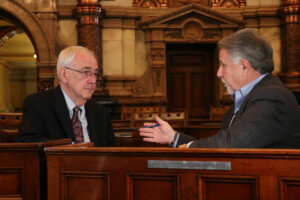
Interview of Tim Emert, October 4, 2019
Interviewed by Jim McLean
Tim Emert's interview covers his Senate career in the last decade of the Twentieth century, following passage of a markedly different school finance bill in 1992 and with a divided Republican caucus in the Senate--a time of big change. Emert stepped into the chairmanship of the Senate Judiciary committee immediately and later moved up to Majority Leader by a one-vote margin. The interview is filled with descriptions of coalitions he formed to get legislation passed. As Judiciary chair Emert dealt with both the death penalty, which he personally opposed, and a bill restricting late term abortions which Show Moreno one liked but passed. He worked with Christine Downey to get a major policy change regarding community colleges. There are also descriptions of his work on the State Board of Education and later, the Board of Regents. Emert describes himself as neither moderate or conservative, but "a realistic Republican." As Majority Leader he talks about the "juggling act" trying to keep communication with the conservative House Speakers (Shallenburger and Jennison) and the Senate. He explains the tension in having both the poorest and richest counties in his district and trying to provide equalization of school funding. The interview touches on the renovation of the Capitol and also renovation of Cedar Crest. Show Less
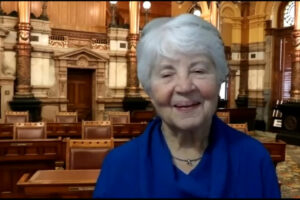
Interview of Sheila Frahm, November 13, 2020
Interviewed by Joan Wagnon
In this 2020 oral history interview, former Kansas State Senator Sheila Frahm reflects on her time in elected office from local school board to U.S. Senate. This interview was conducted on ZOOM with Frahm at her home in Arizona and the interviewer in Topeka. The interview begins with a discussion of an earlier (1991) interview conducted by a Washburn University professor that covers much of Frahm's background and her interest in education issues. It covers her life in Topeka in the early years of her service and how her family moved to Topeka with her for the session each year Show Moreand why. Frahm provides a unique point of view on the relationships between Governors and the Legislature. She discusses her decision to leave the legislature and run for Lt. Governor with Bill Graves and her subsequent appointment to fill a U.S. Senate vacancy when Bob Dole decided to run for President. This interview includes a segment during which Frahm talks about several issues in which she was involved: community colleges and out-district tuition and triple-trailers. During the interview Frahm reflects on her identity as a western Kansas legislator and how her roots, her up-bringing, shaped others' perceptions of her legislatively. She saw the years during which she served in the State Senate as very productive, citing school finance in 1992 and advances in higher education as two important policies that were enacted. The interview concludes with Frahm's reflections on the civility of the body, the importance of relationships to accomplish your goals, and advice to prospective candidates. Show Less
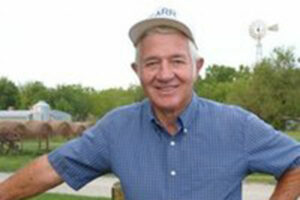
Interview of Gerald (Jerry) Karr, May 11, 2017
Interviewed by Janice Huston
This interview of Senator Jerry Karr by Janice Huston for the Lyon County Historical Society is lengthy, but gives great insight into the 18 years Karr spent in the Kansas Senate. It also covers his academic career which preceded his election and delves into rural life in Kansas. It begins with his Sierra Leone experiences teaching agricultural economics and other teaching jobs in the Midwest. Karr was elected to the state Senate in 1980 which is the time the farm crisis started boiling over in Kansas. During those first 10 years he developed legislation addressing Show Morethe farm crisis, including changing the method of selecting the Secretary of Agriculture, altering the classification and reappraisal of land, and regulating corporate hog farming. His service on the Joint Rules and Regulations Administrative committee helped him shape agricultural policy. He became Minority Leader ten years after his first election. Redistricting in 1991 ended up in the courts and spelled the end of many rural Democrats. There are numerous examples of policy making, particularly the details about the 1992 school finance legislation that amplify others’ accounts of that legislation. His examples of effective leadership and effective campaigning will be of interest to many. The interview also covers communication with constituents in a large district and has anecdotes about issues leaders have to deal with. Karr covers just about all aspects of leading a caucus and life in the Senate in the 1980s and 1990s. Show Less
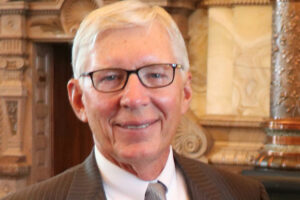
Interview of Dave Kerr, August 23, 2019
Interviewed by Dale Goter
In a 2019 oral history interview Dave Kerr recalls nearly 20 years in the Kansas Senate including his terms as Chair of the Senate Ways and Means Committee and President of the Senate. His tenure in the senate spanned the period when state resources were directed toward economic development, an effort he thought was much needed. Kerr also recalls the revamping of the public education funding formula in 1992 and reorganization of governance and oversight of postsecondary education. He observes that key characteristics of a leader are willingness to listen to various points of view and endure the Show More"slings and arrows" of leadership. Show Less
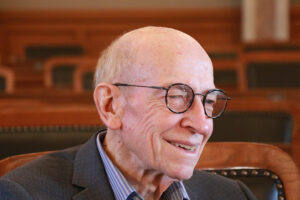
Interview of James (Jim) Maag, July 17, 2014
Interviewed by Burdett Loomis
In this 2014 oral history interview, Jim Maag reflects on his service in the Kansas House of Representatives (1969-1976) including his term as Speaker Pro Tem (1975-1976). It was a time of significant change and modernization of the Kansas Legislature and its processes. Maag provides a clear view into the evolution of the Legislature into a more professional organization. He comments on the bipartisan approaches to policymaking during that era when the urban-rural split affected the dynamic more often than purely partisan considerations. He was witness to the impact of the one person, one vote Show Morecourt case as well as the increased number of women legislators and the reduced number of attorneys. Jim's recollections draw a vivid picture of an institution in transition. His connection with the Legislature continued in his role of legislative liaison for Governor Bennett and later as a lobbyist for the Kansas Bankers Association. Show Less
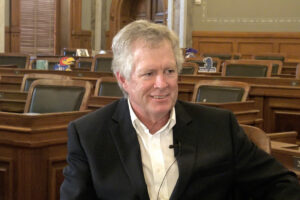
Interview of Dennis McKinney, August 23, 2019
Interviewed by Dale Goter
Dennis McKinney developed many insights in his sixteen years as a leader in the minority party into how the legislature did work, and how it should work. He recounts numerous instances when things worked well because of bipartisan cooperation and compromise. McKinney's experiences on the House Energy and Natural Resources committee working with Carl Holmes and Ken Grotewiel helped shape water policy in Kansas. His experience as a farmer and rancher in south central Kansas coupled with his focus on problem solving led to his reputation as a "middle of the road legislator" who would work Show Morewith both political sides as well as urban and rural. McKinney was committed to public education as well as conservation. The pursuit of fair and balanced tax policy shaped his actions. The interview highlights the importance of leadership from the governor's office and other legislative leaders (Mays, Shallenburger, D. Kerr, Morris). There is an interesting segment about the 2005 Special Session on school finance where McKinney talks about using the courts as leverage. The interview concludes with a brief discussion of the Greensburg tornado. Show Less
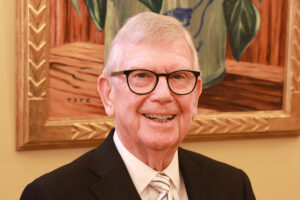
Interview of Gary Sherrer, October 15, 2021
Interviewed by Mike Matson
Gary Sherrer was a debater and it changed his life. His reflections on growing up in Topeka, winning a debate scholarship to Kansas State Teachers College and then teaching for eight years are the perfect backdrop to his later achievements. His association with the Graves Trucking Company and soon-to-be-Governor Bill Graves paved the way for him to become Bill Graves' Lt. Governor. Sherrer won the respect of many Kansas leaders, including Henry Bubb and Jordan Haines, two preeminent bankers who recruited him to the banking industry as chief marketing officer, and later, lobbyist when multi-bank holding company Show Morelegislation was pending. His debate skills served him well as a lobbyist, enabling the controversial bill to pass by one vote. He developed the Leadership Kansas model to train leaders. He knew how to solve community problems and displayed those skills as Secretary of Commerce for Governor Graves. One of his proudest accomplishments was the STAR bonds project in Wyandotte County, with Mayor Carol Marinovich. The interview is replete with examples of programs he developed or guided to fruition. It is interesting to read all the anecdotes about the political scene. Show Less

Interview of James (Jim) Maag, September 28, 2021
Interviewed by Joan Wagnon
The Kansas Oral History Project reviewed the original transcript of Dr. Burdett Loomis's interview of Representative Jim Maag and decided to recapture part of the interview on video for inclusion in a civic education series about the Kansas legislature. This videoed interview follows the original Loomis interview, asking similar questions. A transcription of the video is also posted here. In the original 2014 oral history interview, Jim Maag reflected on his service in the Kansas House of Representatives (1969-1976) including his term as Speaker pro tem (1975-1976). In this reprise of that interview, Maag's words come to life. Show MoreMaag's years in the House spanned a time of significant change and modernization of the Kansas Legislature and its processes. He provides a view into the evolution of the Legislature into a more professional organization. He comments on the bipartisan approaches to policymaking during that era when the urban-rural split affected the dynamic more often than purely partisan considerations. Maag was witness to the impact of the one person, one vote U. S. Supreme Court decision as well as the increased number of women legislators, and the reduced number of attorneys. Jim's recollections draw a vivid picture of an institution in transition. His connection with the Legislature continued in his role of legislative liaison for Governor Bennett and later as a lobbyist for the Kansas Bankers Association. Show Less

Interview of Andy Tompkins, January 13, 2025
Interviewed by Mark Tallman
Dr. Andy Tompkins has had a leading role in education in Kansas that started in 1970 when he was hired to teach English in Hugoton. That job quickly became Principal and then Superintendent of 3 different districts until he was tapped in 1996 as Commissioner of Education. The interviewer, Mark Tallman skillfully leads Tompkins through the changes that have taken place in public education in Kansas over the years. His interview touches on special education, "A Nation at Risk", the movement to improve education, standards and the 1992 School Finance Reform Act. Tompkins is able to Show Moreexplain why things changed and with what result; Tallman has also been active in education with the Kansas Association of School Boards and the two, together lay out the changing educational landscape from 1970 - 2020 including what was happening in higher education. After leaving the commissioner's office, Tompkins began teaching at the college level, then became Dean of the College of Education in Pittsburg, and later, President and CEO of the Kansas Board of Regents and interim President of both Wichita State and Fort Hays Universities. The portrait of Andy Tompkins that emerges from this interview is one of skilled leadership, a trusted leader committed to improving education for all. Show Less
